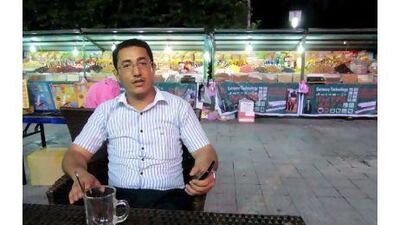YIWU, CHINA // As he sits at an outdoor restaurant on a warm summer evening and sips a small glass of Arab-style tea, Human Shrm could very easily be in his native Syria.
Around him are tables of Arab men smoking shisha and putting the world to right with animated chatter, while a few metres away market stalls are piled high with dates.
Given his surroundings, it is perhaps no wonder the 29-year-old trader, who has lived in Yiwu for eight years, has no plans to leave.
Mr Shrm has married a Chinese woman, Layla, who has converted to Islam. They have a two-year-old daughter, Judi.
"I'm not ever going back to Syria," he says in fluent Mandarin. "I have a life here. I have everything, including my Chinese friends. Everything here just makes you feel very comfortable.
Many feel the same way as Mr Shrm, who runs a company that exports jewellery and accessories to Saudi Arabia and titanium, used in paint, to Egypt.
There are believed to be more than 10,000 Arabs living in Yiwu in eastern China, most of them exporting the low-cost Chinese-made goods sold in the city's vast markets.
Their presence represents a repeat of events from more than a millennium ago, when Arab and Persian traders settled in China and started Islamic communities.
"I feel like Yiwu is part of me," says Rushdy Khalil, 37, a US citizen originally from Sudan who has lived in Yiwu for five years, and who exports furniture and camping and hunting products to Saudi Arabia, where many of his relatives live.
"When I go to Saudi Arabia, for the first three or four days, frankly speaking, I feel like my soul is still in Yiwu."
As well as marrying Chinese women and buying into local businesses - Mr Khalil also runs a Syrian restaurant - Arab residents have shown their commitment to Yiwu in other ways.
They have formed more than half a dozen chambers of commerce, each for traders from a particular country including Iraq, Yemen, Egypt and Sudan, along with an overarching Yiwu Arab chamber.
The groups do not just assist with business-related matters such as registering companies, but also help when residents suffer misfortune.
Recently the groups paid for the repatriation of the body of an Egyptian businessman who died in the city.
"If I get sick, whatever happens … the Sudanese will take care of me. It's the same for Egyptians, for Syrians, for Iraqis, for Yemenis," says Mr Khalil, who pays an insurance fee to the Sudanese chamber of commerce in the city.
Although the Arab community in Yiwu has grown significantly in the past decade, residents say its continued existence depends upon economic conditions.
Abdul Hamid Ahmed, 35, from Egypt, who came to Yiwu three years ago and lives in the city with his Egyptian wife and young son, says whether he remains "depends on my business", which involves exporting construction tools.
"If business is good I will stay," Mr Ahmed says. "So far the business has done very well from Yiwu."
Concerns include difficulties in securing visas and the appreciation of the Chinese yuan, which makes goods exported from Yiwu more expensive when sold overseas.
Mr Shrm says that when he arrived in the city, the exchange rate was 8.28 yuan (Dh4.79) to the US dollar. It is now 6.36.
But whatever happens he is not going back to the Middle East. His wife does not speak Arabic and his daughter is likely to feel more at home in the country where she was born.
"She can understand my Arabic," Mr Shrm says of Judi. "But she doesn't respond in Arabic. She replies in Chinese."
Despite economic difficulties, Arab traders are still flocking to Yiwu.
The Yemeni Abdullah Mudhish, 34, is looking to send children's clothing to his home country, where his brother will sell them. Mr Mudhish arrived a couple of weeks ago after taking a course in Mandarin.
"There are two big communities from Yemen in China: one in Guangzhou and one in Yiwu," he says. "As soon as I arrived in Yiwu I felt I was at home. There was an Arabic flavour."
There is a constant flow of temporary visitors from the Arab world, who come for a few days or a month or two to arrange orders.
Haider Mortda, 28, from Baghdad, says the city draws in buyers because it offers the best prices.
"Before I bought clothes in Dubai but it's expensive in Dubai."


